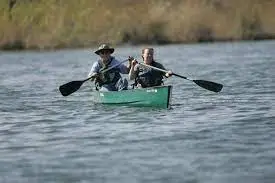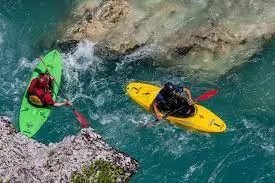
Low-Impact Adventure Activities For Eco-Friendly Travel
By Steven Green | 15 July, 2023
Did you know that tourism contributes to nearly 10% of global greenhouse gas emissions? As an adventurer with a conscience, you’re probably looking for ways to enjoy your travels without compromising our planet’s health.
Well, this article is just the guide for you! We’ll explore low-impact adventure activities that let you indulge in your love for exploration and thrill while maintaining an eco-friendly approach.
From responsibly hiking through luscious trails and having sustainable wildlife encounters, to engaging in green water sports and conscious mountain climbing, we’ve got it all covered!
We’ll also delve into responsible cycling tours, sustainable camping practices, and environmentally conscious bird watching.
So strap on your boots, pump up those tires or grab those binoculars – let’s embark on an adventure that respects nature as much as it thrills us. Because being eco-conscious doesn’t mean dulling down the excitement – it simply adds another layer of satisfaction to your travel experiences!
Key Takeaways
- Low-impact adventure activities for eco-friendly travel can help reduce the environmental impact of tourism, which contributes to 10% of global greenhouse gas emissions.
- Responsible hiking practices, such as following trail etiquette and Leave No Trace principles, as well as using sustainable gear, can minimize the negative impact on natural landscapes.
- Engaging in sustainable wildlife encounters, such as ethical safaris, butterfly watching, bee tourism, marine conservation trips, and turtle tracking, allows travelers to appreciate wildlife while supporting conservation efforts.
- Participating in green water sports like eco kayaking, sustainable surfing, green diving, environmentally friendly paddleboarding, and low impact sailing ensures that water-based activities are conducted in an environmentally conscious manner.
SUBSCRIBE
- Key Takeaways
- Hiking and Trekking Responsibly
- Sustainable Wildlife Encounters
- Green Water Sports
- Conscious Mountain Climbing
- Responsible Cycling Tours
- Sustainable Camping Practices
- Environmentally Conscious Bird Watching
- Green Travel Tips for Adventurers
- Frequently Asked Questions
- How can I reduce my carbon footprint while traveling to and from adventure activities?
- What are some eco-friendly travel companies that prioritize sustainable adventure activities?
- Are there any specific gear or equipment that are more eco-friendly for adventure activities?
- How can I contribute to local communities while participating in these low-impact adventure activities?
- What measures can I take to ensure my food and drink consumption during these activities is sustainable?
- Conclusion
Hiking and Trekking Responsibly
Just as you’re lacing up your boots for a hike, remember that it’s not just about the adventure, but also about trekking responsibly to preserve our stunning eco-systems.
Embracing trail etiquette is key; yield to others on narrower paths and always respect signs and markers. The Leave No Trace principles are your bible here; only take memories and leave footprints.
This includes responsible gear selection – opt for equipment made with sustainable materials when possible. Minimalist packing is another consideration; pack light but smart, taking only what you’ll need. Don’t forget seasonal considerations too – winter treks can have a higher impact on delicate environments due to increased gear requirements.
As you explore these green trails, let’s shift focus next towards creating sustainable wildlife encounters.


Sustainable Wildlife Encounters
Imagine being surrounded by exotic animals in their natural habitat, all while ensuring your visit doesn’t disturb their peace or hinder their wellbeing. It’s a magical experience that can be yours through sustainable wildlife encounters.
- Ethical safaris are one way to get up close and personal with majestic creatures like elephants and lions, without contributing to harmful practices.
- Butterfly watching and bee tourism offer unique opportunities for you to appreciate the smaller inhabitants of our planet, while also learning about the crucial roles they play in our ecosystems.
- With marine conservation trips and turtle tracking experiences, you’ll witness the incredible life beneath the waves as you contribute to preserving these spectacular species.
As you journey further into eco-friendly travel, consider immersing yourself next in the exhilarating world of green water sports.


Green Water Sports
You’ll find there’s a whole new world to discover when you dive into green water sports, offering thrilling experiences that respect and protect our planet’s precious waters.
Eco kayaking benefits are twofold; it provides a serene encounter with nature while ensuring the ecosystem remains undisturbed.
Sustainable surfing adopts practices like using eco-friendly surfboards made from recycled materials.
Green diving practices encourage divers to avoid touching marine life or stirring up sediment, preserving the underwater environment for future explorers.
Environmentally friendly paddleboarding involves using boards made of sustainable materials, reducing your carbon footprint.
Similarly, low impact sailing utilizes wind power instead of fuel engines, minimizing pollution in our oceans and seas.
Ready for more? Let’s elevate your adventure as we explore conscious mountain climbing next!


Conscious Mountain Climbing
Did you know that an impressive 147 million people worldwide participate in outdoor rock climbing each year? This exhilarating sport not only gives a rush of adrenaline but also promotes conscious practices to protect our mountainous terrains.
As more climbers opt for low-impact adventure activities, there are several strategies you can adopt:
- Climbing gear recycling: Many brands offer programs to recycle old gear, reducing waste.
- Mountain conservation efforts: Participate actively in initiatives aimed at preserving the natural beauty of climbing sites.
- Local involvement benefits: Patronize local businesses and contribute to the local economy.
- Climate-friendly climbing & Eco-friendly mountaineering equipment: Choose eco-conscious gear and respect nature by leaving no trace.
Ready for your next adventure? Let’s explore the world of responsible cycling tours.


Responsible Cycling Tours
Cycling tours are an incredible way to immerse yourself in new environments, but it’s crucial we do so responsibly to safeguard our planet.
Choosing the right bicycle type is essential; opt for those created with sustainable materials and processes. Cycle maintenance is key not only for your safety but also to ensure minimal waste through unnecessary replacements. Consider puncture-resistant tires and durable components, reducing the need for frequent changes.
Tour planning should respect local habitats and wildlife. Stick to established paths, maintain a safe speed and observe cycling etiquette by avoiding loud noises that can disrupt animals. Safety measures include wearing a helmet, using lights at night, and carrying a first aid kit.
After rolling off on your bike, you can further embrace eco-friendly practices by pitching your tent mindfully during camping escapades.


Sustainable Camping Practices
Moving from the exhilaration of responsible cycling, consider immersing yourself even deeper into nature with sustainable camping practices.
Camping is a fantastic way to connect with the environment, and it’s easy to make it eco-friendly. Start by choosing gear that’s built to last and made sustainably. Eco-friendly gear not only reduces waste but also respects nature’s resources.
Plan zero waste meals, reducing unnecessary packaging and food waste. Instead of a gas-fueled fire pit, opt for natural campfires using dead wood found on site or bring your own sustainably sourced firewood.
Embrace minimalist camping, bringing only what you need. Most importantly, adhere strictly to Leave No Trace principles: take nothing but photos; leave nothing but footprints.
As we transition next into bird watching, remember these principles hold true there as well–respecting our feathered friends’ habitats is paramount.


Environmentally Conscious Bird Watching
As you quietly tread through the forest, binoculars in hand, you’re about to discover the fascinating world of bird watching done right: a practice that, if carried out with environmental consciousness, can serve as a profound testament to our commitment to respect and protect nature’s winged wonders.
The right birding equipment is crucial – not just for species identification but also for minimizing impact on habitats. Using digital guides instead of paper ones reduces waste while enhancing your knowledge of migration patterns.
Ethical practices should guide you: never disturb nests or feeding sites; always maintain distance. With habitat preservation in mind, choose only designated paths. This way, your adventure leaves no trace except memories and a heightened sense of responsibility towards nature’s treasures.
Next up are some green travel tips for adventurers who are looking to make their journeys even more sustainable.
Green Travel Tips for Adventurers
Embracing sustainable practices on your travels isn’t just a nod to Mother Earth, it’s also an affirmation of your commitment to protect her beauty and resources.
Eco-friendly backpacking calls for lightweight, green travel gear made from recycled or sustainably sourced materials.
When traversing the globe, consider sustainable transportation options such as biking, walking, or using public transit whenever possible.
Remember that minimizing travel waste is crucial. Opt for reusable water bottles, avoid single-use plastics, and carry compact waste bags for unexpected litter pick-ups along your journey.
Lastly, plan low-impact adventure meals that require minimal packaging and leave no trace behind.
These simple yet effective steps can transform you into a green adventurer, embodying respect and responsibility towards our shared planet while satisfying your wanderlust in an eco-conscious way.
Frequently Asked Questions
How can I reduce my carbon footprint while traveling to and from adventure activities?
Use green transportation methods, pack minimally and choose sustainable accommodation. Practice responsible sightseeing to preserve nature. Consider carbon offsetting your travel. By doing so, you’ll significantly reduce your carbon footprint during adventure travels.
What are some eco-friendly travel companies that prioritize sustainable adventure activities?
Contrast traditional travel with Intrepid Travel or G Adventures, offering green accommodations and eco-friendly transportation. They prioritize sustainable tours, responsible wildlife encounters, even ethical souvenir shopping for a wholly environmentally friendly adventure experience.
Are there any specific gear or equipment that are more eco-friendly for adventure activities?
Absolutely! Opt for recycled materials gear, solar powered equipment and biodegradable camping supplies. Also, consider eco-friendly hiking boots and sustainable fishing gear to lessen your environmental footprint while adventuring.
How can I contribute to local communities while participating in these low-impact adventure activities?
Embrace the joy of giving back by supporting artisanal crafts, joining community volunteering, and participating in farming. Enhance cultural preservation efforts through ethical souvenir shopping. Your adventure becomes a journey of meaningful contributions to local communities.
What measures can I take to ensure my food and drink consumption during these activities is sustainable?
Opt for sustainable snacking by sourcing local, organic produce from nearby markets. Use biodegradable utensils and aim for zero waste meals. Boost your eco-friendly hydration with refillable bottles to lessen plastic consumption.
Conclusion
So, you’re ready to embark on an eco-friendly adventure? You can hike and trek responsibly, enjoy sustainable wildlife encounters, partake in green water sports, or conscious mountain climbing.
Maybe you’d prefer a responsible cycling tour, sustainable camping practices, or environmentally conscious bird watching.
No matter your preference, these low-impact activities contribute to preserving our beautiful planet while feeding your adventurous spirit.
Remember these green travel tips and make every adventure a step towards sustainability!
